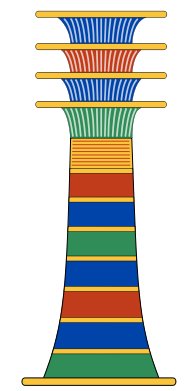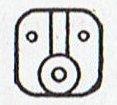 |
 |
 |
 |
|
Bb3-5
(421 + 83) |
Bb3-6 (84) |
Bb3-7 |
Bb3-8 |
|
ki te henua |
koia - kua
hoki to maro |
e manu rere ra |
ki te inoino -
ka rere te manu |
|
RIGHT ASCENSION DAYS AT THE FULL
MOON: |
|
Arku-sha-rishu-ku-2 (Back of the
Head of Ku)
2h (*30.4 = *354.0 + *41.4)
κ
Arietis (30.3),
HAMAL (Sheep)
=
α
Arietis
(30.5)
ALKES (α
Crateris) |
DELTOTUM = β Trianguli
(31.2), ι Trianguli (31.7), η
Arietis (31.9) |
ξ¹ Ceti
(32.1) |
γ,
δ
Trianguli (33.0),
χ
Persei (33.2),
10 Trianguli
(33.5),
θ
Arietis (33.3),
MIRA
(Astonishing) =
ο
Ceti
(33.7) |
|
djed |
 |
Phoenician
sāmekh |
 |
Greek
xi |
Ξ (ξ) |
|
... In
rongorongo times the last
Greek lettered star
in Orion (ξ)
rose with the Sun in June
21. The letter seems to have
originated from the
Phoenician letter samekh
(tent peg, supporting prop),
which in turn may have been
derived from the ancient
Egytian djed column
...
 |
|
|
April 20 (110 = 22 * 5) |
21 (325 - 214 = 365 - 254) |
22 →
Dramasa
(*32 * 10) |
23 (*31) |
|
... About Carmenta we know from the
historian Dionysus Periergetis that
she gave orcales to Hercules and
lived to the age of 110 years. 110
was a canonical number, the ideal
age which every Egyptian wished to
reach and the age at which, for
example, the patriarch Joseph died.
The 110 years were made up of
twenty-two Etruscan lustra of
five years each; and 110 years
composed the 'cycle' taken over from
the Etruscans by the Romans. At the
end of
each cycle they corrected
irregularities in the solar calendar
by intercalation and held Secular
Games. The secret sense of 22 -
sacred numbers were never chosen
haphazardly - is that it is the
measure of the circumference of the
circle when the diameter is 7. This
proportion, now known as pi,
is no longer a religious secret; and
is used today only as a
rule-of-thumb formula, the real
mathematical value of pi
being a decimal figure which nobody
has yet been able work out because
it goes on without ever ending, as
22 / 7 does, in a neat recurring
sequence [3.142857142857 ...]. Seven
lustra add up to thirty-five years,
and thirty-five at Rome was the age
at which a man was held to reach his
prime and might be elected Consul.
(The same age was fixed upon by a
Classically-minded Convention as the
earliest at which an American might
be elected President of the United
States.) ... |
|
RIGHT ASCENSION AT THE SUN: |
|
Oct 20 |
21 (*214) |
22 (295 = 10 * 29½) |
23 |
|
14h (213.1)
π Hydrae,
χ
Centauri (213.0),
MENKENT (Shoulder of the Centaur) =
θ
Centauri
(213.1) |
Neck-2
(Dragon)
ASELLUS TERTIUS (3rd Ass Colt) =
κ
Bootis,
κ
Virginis,
14 Bootis
(214.8) |
Al Ghafr-13
(The Cover) /
Svāti-15 (Very
Good) /
TAHUA-TAATA-METUA-TE-TUPU-MAVAE-6
(a pillar to stand by)
15 Bootis
(215.2),
ARCTURUS =
α
Bootis (215.4),
ASELLUS SECUNDUS (2nd Ass Colt) =
ι
Bootis
(215.5),
SYRMA (Train of the Virgin's Robe) =
ι
Virginis,
λ
Bootis (215.6),
η
Apodis (215.8)
*174.0 = *215.4 - *41.4 |
ι Lupi,
18 Bootis
(216.3),
KHAMBALIA
(Crooked-Clawed) = λ Virginis
(216.4),
υ Virginis (216.5), ψ Centauri
(216.6), ε Apodis (216.8)
*175.0 = *216.4 - *41.4 |
|
Egyptian hand |
 |
Phoenician kaph |
 |
Greek
kappa |
Κ
(κ) |
|
Kaph
is thought to have been
derived from a pictogram
of a hand (in both
modern Arabic and modern
Hebrew, kaph
means palm/grip) ...
...
The manik, with
the tzab, or
serpent's rattles as
prefix, runs across
Madrid tz. 22 , the
figures in the pictures
all holding the rattle;
it runs across the
hunting scenes of Madrid
tz. 61, 62, and finally
appears in all four
clauses of tz. 175, the
so-called 'baptism'
tzolkin. It seems
impossible, with all
this, to avoid assigning
the value of grasping or
receiving. But in the
final confirmation, we
have the direct evidence
of the signs for East
and West. For the East
we have the glyph
Ahau-Kin, the Lord
Sun, the Lord of Day;
for the West we have
Manik-Kin, exactly
corresponding to the
term Chikin, the
biting or eating of the
Sun, seizing it in the
mouth.



The
pictures (from Gates)
show east, north, west,
and south; respectively
(the lower two glyphs)
'Lord' (Ahau) and
'grasp' (Manik).
Manik was the 7th
day sign of the 20 and
Ahau the last ... |
|
The First Point of Aries was in
Roman times
Sheratan (β
→ female) but earlier it had been
Hamal
(α → male).
|








